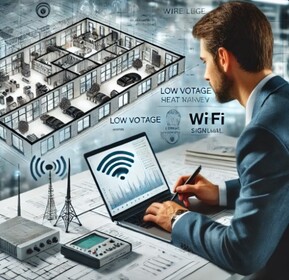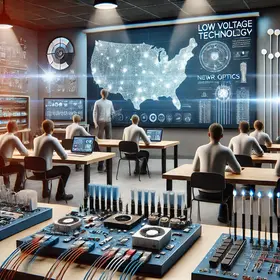The electrical industry encompasses a wide variety of specialized professionals, each catering to specific needs. Among these, low voltage electrical contractors and commercial electrical contractors are two distinct categories. While they may seem similar at first glance, their scope of work, tools, and expertise vary significantly. Here’s a breakdown of the key differences:
1. Scope of Work
Low Voltage Electrical Contractors
- Definition: Low voltage contractors focus on systems that operate at 50 volts or less, such as telecommunications, audio-visual, security systems, and data cabling.
- Primary Responsibilities:
- Installing and maintaining structured cabling systems (e.g., Ethernet).
- Setting up and configuring security cameras, access control systems, and intercoms.
- Fiber optic installations for high-speed data transmission.
- Audio-visual systems, such as projectors, conference room setups, and sound systems.
- Wireless networks, including Wi-Fi access points and IoT device integration.
- Key Industries Served: Office buildings, homes, retail spaces, healthcare, and smart home environments.
Commercial Electrical Contractors
- Definition: Commercial electrical contractors handle electrical systems for businesses and industrial applications, typically involving high voltage systems.
- Primary Responsibilities:
- Installing and maintaining high-voltage electrical wiring and distribution systems.
- Setting up power systems for HVAC, lighting, and industrial equipment.
- Emergency power systems, such as backup generators and UPS systems.
- Energy-efficient upgrades, such as LED retrofits or solar panel installations.
- Compliance with building codes and safety regulations for industrial and commercial spaces.
- Key Industries Served: Manufacturing facilities, warehouses, office complexes, retail stores, and educational institutions.
2. Voltage and Equipment
Low Voltage Systems:
- Operate below 50 volts.
- Equipment includes Cat5e/Cat6 cables, fiber optic cables, patch panels, switches, and wireless routers.
- Tools often involve crimpers, network testers, and fiber fusion splicers.
High Voltage Systems:
- Operate at voltages above 50 volts, often in the hundreds or thousands.
- Equipment includes electrical panels, circuit breakers, transformers, and high-power lighting.
- Tools involve multimeters, conduit benders, and heavy-duty wiring equipment.
3. Required Skills and Certifications
Low Voltage Electrical Contractors
- Skills: Networking, telecommunications, system design, and integration.
- Certifications:
- BICSI Technician Certification.
- CompTIA Network+ or similar IT-related credentials.
- Manufacturer-specific certifications (e.g., for access control or camera systems).
Commercial Electrical Contractors
- Skills: High-voltage wiring, electrical load calculations, and compliance with the National Electrical Code (NEC).
- Certifications:
- State-specific electrician licenses.
- National Electrical Contractors Association (NECA) certifications.
- OSHA safety certifications.
4. Project Complexity and Safety
Low Voltage Work
- Projects are generally less hazardous due to lower voltage levels.
- Safety concerns are minimal compared to high-voltage systems.
- Emphasis is on system reliability, signal clarity, and proper integration.
High Voltage Work
- Projects often involve significant safety risks, including fire hazards and electrical shocks.
- Strict adherence to safety codes is essential.
- Requires heavy-duty protective equipment and specialized training.
5. Overlap in Services
While the two professions are distinct, some overlap exists:
- Lighting Systems: Both may install low-voltage LED lighting systems.
- Power Supply: Low voltage contractors may work alongside commercial electricians for systems requiring both low and high voltage power connections (e.g., security systems powered by main panels).
- Smart Buildings: Both contractors often collaborate on smart building projects where traditional electrical systems and low voltage technologies intersect.
Conclusion: Choosing the Right Contractor
When deciding between a low voltage electrical contractor and a commercial electrical contractor, consider the specific needs of your project:
- For IT infrastructure, security systems, and communications technology: Choose a low voltage contractor.
- For power systems, high-voltage wiring, and industrial equipment: Opt for a commercial electrical contractor.
Both professions play critical roles in the modern world, ensuring seamless connectivity and reliable power in commercial and residential settings.


